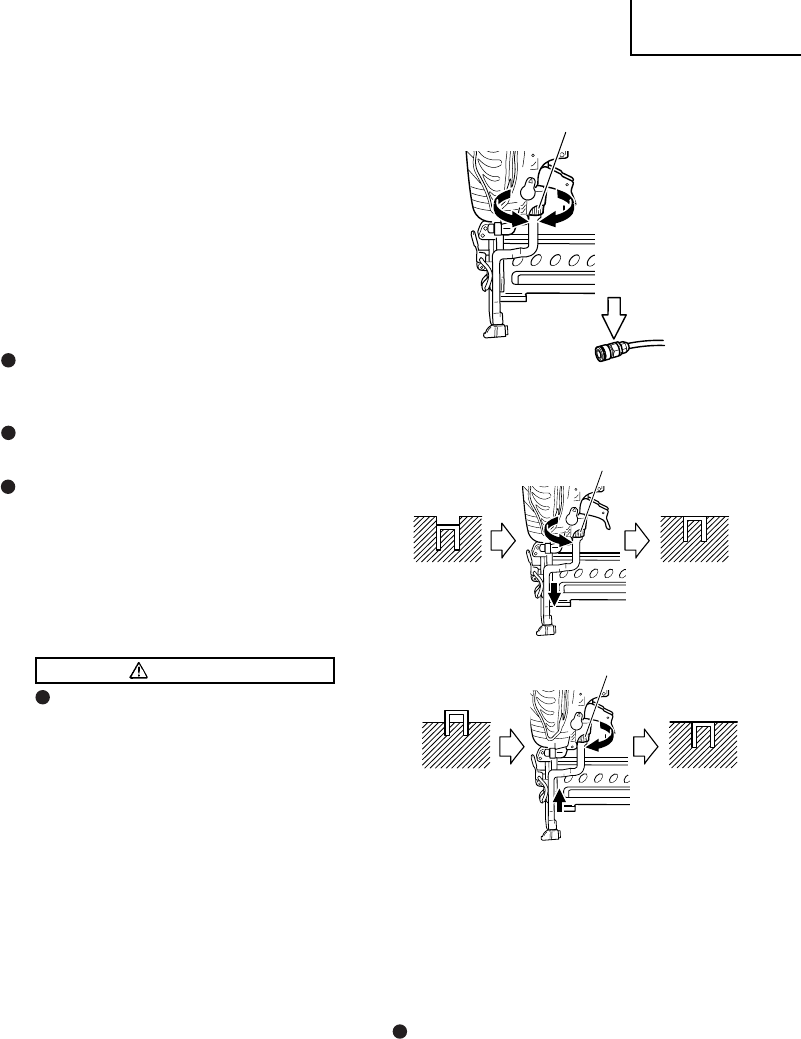
English
15
2
If staples are driven too deep, turn the adjuster to
the shallow side.
If staples are driven too shallow, turn the adjuster
to the deep side.
1
DISCONNECT AIR HOSE FROM STAPLER.
Disconnect
air hose
15
Adjuster
Too Deep
Turn Adjuster
Flush
3
Stop turning the adjuster when a suitable position
is reached for a stapling test.
4
Connect the air hose.
ALWAYS WEAR SAFETY GLASSES.
Perform a stapling test.
5
DISCONNECT AIR HOSE FROM STAPLER.
6
Choose a suitable position for the adjuster.
NOTE:
The staple might not drive deep enough if using
high pressure with the adjuster set upwards
(shallow side) due to factors such as the material
hardness or staple type.
If that happens, reduce pressure and set the
adjuster to lowest position so the staple drives in
at a good position.
Too Shallow
Turn Adjuster
Flush
After stapling:
1) disconnect air hose from the Stapler;
2) remove all staples from the Stapler;
3) supply 5 – 10 drops of Hitachi pneumatic tool
lubricant into the air plug on the Stapler; and
4) open the petcock on the air compressor tank
to drain any moisture.
ADJUSTING THE STAPLING DEPTH
WARNING
When adjusting the Adjuster, be sure to
remove your finger from the trigger and
disconnect the air hose from the stapler.
To assure that each staple penetrates to the same depth,
be sure that:
1) the air pressure to the Stapler remains constant
(regulator is installed and working properly), and
2) the Stapler is always held firmly against the
workpiece.
If staples are driven too deep or shallow into the
workpiece, adjust the stapling in the following order.
NOTE:
If all warnings and instructions are followed, safe
operation is possible with two systems:
SINGLE SEQUENTIAL ACTUATION MECHANISM,
CONTACT
ACTUATION MECHANISM.
Always handle staples and package carefully. If
staples are dropped, collating bond may be broken,
which will cause mis-feeding and jamming.
The SINGLE SEQUENTIAL ACTUATION MECHANISM
may reduce the possibility of bodily injury to you or
others in the work area compared to the CONTACT
ACTUATION MECHANISM. This is because it is less
likely to drive an unwanted nail if you keep the trigger
pulled and accidentally bump the push lever against
yourself or others.
The SINGLE SEQUENTIAL ACTUATION MECHANISM
may also reduce the speed of operation compared to
the CONTACT ACTUATION MECHANISM. The SINGLE
SEQUENTIAL ACTUATION MECHANISM is
recommended to inexperienced users.


















